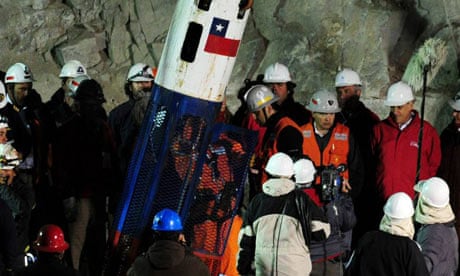After 69 days underground, the miners trapped in the San José mine in Chile today began their journey to the surface.
There is no doubt it's a great day for the miners and their families. But as we celebrate their safe and successful return, let's also take a moment to consider some of the commentary on the safety of Chile's mines, labour rights and the potential dangers of an export-oriented development strategy. These are important considerations which have become buried in the avalanche of news about extramarital affairs and lucrative movie deals.
"Los 33" were discovered in late August, after they had already been trapped underground for over two weeks. But in contrast to the excitable coverage of recent weeks, a question implicit in other commentaries has been: how could this have happened in a middle-income country, often congratulated for its development progress?
Several commentators – including international trade unions – have pointed to Chile's failure to ratify International Labour Organisation (ILO) conventions on safety and health in mines, and drawn attention to the consequences of inadequate workplace safety standards across the country. According to the Inter Press Service, in 2009 alone Chile had a total of 191,685 workplace accidents, including 443 deaths.
Carmon Espinoza, head of the Chilean NGO Programa de Economia del Trabajo (Labour Economy Program) remarked in late August that job insecurities mean miners "for logical reasons pay greater attention to keeping their jobs than to work safety".
The San José mine, in particular, is no stranger to workplace tragedy: over a dozen lives have been lost there in recent years.
Bélgica Ramírez, sister-in-law of one of the trapped miners, suggested that even if workers did express their concerns, they were ignored. "The mine was in precarious condition and they [the miners] always told the bosses, but the only thing they cared about was production," she said.
In early September, a Guardian report revealed that "the dangers were so well known that locals called its miners 'the kamikazes'." Even the owners of the mine recognised the dangers, offering "salaries 30% higher than average, a tacit acknowledgement that the job required extraordinary sacrifices".
Other commentators went further, arguing that the mine collapse happened not in spite but because of Chile's rapid economic growth and reliance on an export-oriented development strategy.
Blogging on the Reuters site, Stacy Torres, a PhD student at New York University, lashed out at the lack of safety standards to "protect the workers who make Chile's prosperity possible". She argued: "despite reigning as Latin America's economic powerhouse for the past two decades, Chile continues to suffer from some of the highest levels of income inequality in the world. The struggle of the country's trapped miners has once again laid bare the human costs of such 'progress'."
Chile is the world's largest producer of copper, and the country's often-congratulated 4-5% growth rate has been largely fuelled by copper exports to Europe, the US, China and India. The government celebrates Chile's status as a prime investment destination, and is proud to proclaim the country as Latin America's fastest growing economy.
However, though Chile's drop in absolute poverty rates (which have fallen from 40% in 1990 to 14-15% today) is accredited to the country's rapid and sustained economic growth, inequality figures have barely budged. According to the 2009 UN human development report, of the 147 countries for which there are figures, Chile is the 19th most unequal state in the world in terms of the social distribution of the country's wealth. Figures from the report suggest that the richest 10% account for 40% of Chile's income and expenditures, while the poorest account for only 1.6%.
While labour standards and workers' rights are often sidelined by the aggressive "pro-growth" talk of development economists, they are fundamental components of social or human development.
A 2004 report from the UK's Department for International Development argued for "making the improvement of labour standards a part of the international community's strategy to achieve the MDGs [millennium development goals]".
Though the ILO has reported that "more than 75% of the global population do not enjoy a set of social guarantees that allow them to deal with life's risks", it argues that the promotion not just of work, but of "decent work" – underpinned by rights and social protections, including safeguards for income, health and safety – is necessary for the eradication of extreme poverty and hunger (MDG1).
Unfortunately, these insights seem to have been overlooked.
No man has done more for this shift in coverage than Chile's charismatic president, Sebastián Piñera, who leaped into the media spotlight by quickly firing top officials of Chile's mining regulator and promising an independent expert inquiry into the accident. More recently, he postponed his trip to Europe until after the miners' rescue and erected new mobile phone towers to provide the thousands of journalists who have descended on the Atacama desert with high-speed connections to disseminate their coverage of the evacuation.
While there is much to celebrate today – primarily that the names of the miners will not be added to the long list of men and women in Chile who have lost their lives in the workplace – the spectacle of the rescue should not overshadow the importance of the question: how could this have happened in the first place?

Comments (…)
Sign in or create your Guardian account to join the discussion